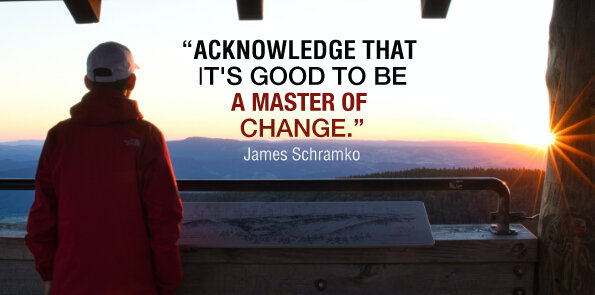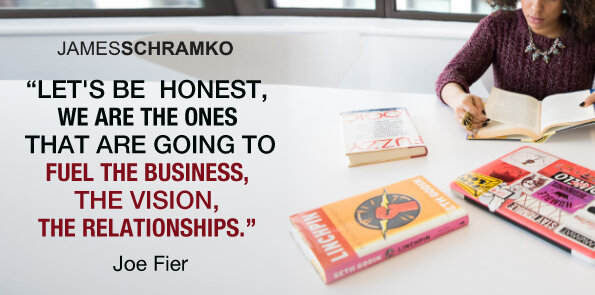Podcast: Download (Duration: 1:00:44 — 56.4MB)
Get Notified Of Future Episodes Apple Podcasts | Spotify | Amazon Music | Android | Blubrry | Gaana | TuneIn | Deezer | Anghami | RSS | More
For five years now, James and fellow podcaster Joe Fier have collaborated on an annual simulcast episode, featured on both their respective shows. Their topic this year is change and adapting to change, a constant theme in both of their businesses.
James and Joe will share stories where the ability to adapt contributed to their success.
They’ll discuss strategies for dealing with change.
And they’ll examine how making changes can shape a better business and way of living.
Table of contents
1. Navigating the wild west online
2. The big change that is AI
3. Knowing it’s time to change
4. A few big lessons
5. When you’re doing too much for too little
6. The process of making changes
7. Results of implementing change
8. What’s new with Joe?
9. Same platform, different topic
10. Getting to where Joe is now
11. Living your life while you can
12. Remember to review and evaluate
13. James’s hierarchy of activity
14. Joe and the daily reset
Navigating the wild west online
Constant change in the online marketplace puts pressure on businesses to innovate.
James and Joe remember the early days of online marketing, and how difficult it was to build websites and run ads. While some core fundamentals remain unchanged – email, for instance, is still a strong source of conversions – businesses must be prepared to adapt to new technologies and trends in order to stay competitive.
James recalls his own experience of navigating change when he left his job to start his own business. He committed then to being responsible for his own success in the face of change, of which there’s been a lot.
The big change that is AI
The importance of adapting to change in the online business space is especially relevant today, with the current wave of AI technology. James believes this development is substantially different from previous advances in the impact it will have.
It’s certainly changing how James runs his business, which highlights the significance of paying attention to one’s own response to trends and changes. Some people are scared of change, when they should acknowledge that mastering change is a powerful weapon in the world of online entrepreneurship.
Joe agrees that welcoming change is essential, even if it challenges beliefs and business models. He notes that he has experienced a lot of changes in his own business over the last year, both external and internal.
Knowing it’s time to change
Joe knows James has actually initiated change in his business recently, and not for the first time. He’s curious as to what prompted it.
James determines the need for change in a number of ways. One is gut feel or intuition, a sense perhaps of resistance to something, paired with the information you have available at the time.
Another is to regularly review one’s situation, set review points, and evaluate the results with the benefit of hindsight. James recommends periodically re-evaluating one’s business, recalibrating it from scratch, and discarding or changing parts that are not working.
James gives examples from his own experience, such as rebranding his program several times to adapt to changes in social media and customer behavior. He also mentions the concepts of inherent simplicity and innovation in the theory of constraints, which advocate ditching old systems and coming up with fundamentally new ideas.
Amid all this, James emphasizes that the ultimate goal of change is to build a business that can fuel one’s lifestyle and that one would not want to quit from.
A few big lessons
Along James’s business journey, there have been some big lessons. He acknowledges, for instance, being slow to move to personal branding, but has maintained control over his assets, including his email database, which he considers essential.
James goes for a steady ship and operates from a place of calm, avoiding the danger of creating change for the sake of change. In coaching others, however, he noticed an inflation of coaching rates, causing him to recalibrate and learn a valuable lesson about retention, which he believes is a function of relationships and results within a membership.
He prides himself on having excellent relationships with his members, some of whom he has known for up to 12 years, and met in person.
When you’re doing too much for too little
When James set his rates a long time ago, he grandfathered some of his customers into lower rates. He realized afterwards, however, that it tied up time and energy that could be sold for a higher rate.
He compares this to buying a car and locking in a price a year in advance, which would not be a good idea because the market could change. It’s important, says James, to stay in step with the market and make changes when necessary to avoid ripping oneself off.
With this insight, James has made changes to his pricing structure in phases to align with the market.
The process of making changes
James discusses how he implemented major changes in his business, using a 3D process: Data collection, Decision-making, and Doing.
One of the changes he made was to update the brand name and migrate hundreds of members from old plans to new ones. He went in and unsubscribed hundreds of thousands of dollars’ worth of subscriptions, setting up a scheduler so that it happened just before renewal, and explained what was happening in videos.
With the growing audience for micro-content, James also added a Playbooks section to his membership, where he condensed his old trainings into one-page playbooks, published once a week, which have been very popular with members.
Another new option was for members who were no longer getting private coaching to have pods, or live discussions with each other, which has been a success. James joins the pods himself and acts as a facilitator or supervisor.
Results of implementing change
The recent overhaul of James’s business has involved eliminating unproductive offerings and focusing on high-performing partnerships and affiliate marketing. He’s found that this allows him to reduce his workload and increase his effective hourly rate.
James also emphasizes the need to analyze performance metrics and be willing to make changes, even if it means losing some customers.
What’s new with Joe?
But James wants to know, what changes has Joe seen?
In the last year, Joe’s podcast changed direction due to loss of alignment with his co-host, Matt Wolfe, and some interest in Web3 Crypto.
Matt and Joe collaborated with old marketing friends to apply content marketing to this industry, which resulted in building a media brand called Hard Fork Media. They connected with guests such as Justin Kan, the founder of Twitch, and David Wurtz, co-founder of Google Drive and Google Fonts.
The audience wasn’t large, however, and scams and hacks put a bad taste of crypto into people’s mouths. Joe was also less interested in the Web3 Crypto than his partners, causing friction, which eventually led to him parting ways with Matt.
Same platform, different topic
At the same time, there was a disconnect between the co-hosts and the audience they’d cultivated for over 10 years. As James observes, they seemed to have taken the same platform and just changed the topic.
Pretty much, says Joe.
They could have started a new podcast and brand for whoever was interested, says James, but they kept the brand. Likely some people were confused, and some just weren’t into the new topic.
The relationship with the audience, says James, can dictate the decisions you make with your business. He’s fortunate to have retained almost all the relationships from the earlier iteration of his business, at a price point that will let him continue helping them.
Joe admits to having had an amount of boredom with his podcast before, which led him to make a big change in an effort to find himself. James suggests that if someone is not feeling right about something, they should revert to where they were on the good path and start again, as Joe has recently done.
Getting to where Joe is now
Joe quit his business with Matt and their friends after objectively assessing the numbers and seeing there was no money in the industry. He spent hours writing a message defending his stance, and felt a huge weight lift in implementing his decision.
Joe asserts it’s essential to assess how you want to live, because the business is there to fuel your life. James tells Joe he is in a good age to slingshot the next decade, and the vast majority of his wealth is yet to come.
Joe credits James with providing him with a needed spark. After Joe quit his business, James reminded him of the podcast. It was a castle with gold bars they’d left behind, and James encouraged him to go get them.
Living your life while you can
James is right, reflects Joe. At 38 he’s a prime age to get out and experience. You have to live life to the fullest, and not take time for granted.
James lives every single day. He stresses the importance of spending time with loved ones and having meaningful experiences, because you’ll never get back time.
And there’s immense value, he says, in having a friend to support and guide you through difficult times. He was pleased to be there for Joe, because he missed the old version of the podcast, and he’s glad both Joe and Matt are winning in their current situations.
Remember to review and evaluate
James imagines Joe is looking now to strengthen and consolidate his next pathway. He reminds Joe to review and evaluate his decisions and feel: Is it working? Would you do it again? Or what should change? And if you’d change it, why not now?
He recommends assessing progress periodically, suggesting an annual review at the minimum. For his clients, he prescribes it every 12 weeks.
This review should cover various aspects of one’s life, not just money or work, but also relationships, skills, and personal interests.
James’s hierarchy of activity
James shares with Joe a hierarchy of activity that he refers to as his “activity iceberg,” which consists of five levels: thinking, researching, drafting, editing, and doing/tuning. He believes that people should spend more time on the first four levels and less time on the last level, which is often the only part that is visible to others.
James emphasizes the importance of creating in two phases, drafting and editing, before doing, and then learning from the doing and adjusting accordingly.
In his view, people should avoid making big declarations on social media and instead focus on doing their work in the background, so that what others see is the part they did. He believes also that too many people spend their time grinding and doing without putting enough thought, research, drafting, and editing into their work.
Joe and the daily reset
Joe has realized in the last year that he lacked a daily reset, what for James is surfing. He mentions Alan Watson from the UK who speaks of a hierarchy of behavior, and how important it is to address the physiological aspect the body.
Joe has since developed a physical daily routine, which includes working out at his gym garage, running, and doing breath work.
He and James discuss the importance of personal metrics to gauge one’s energy and stress level, and how this can drive one’s business, relationships, and vision.
For James, sleep is still the ultimate performance enhancer – it’s the secret weapon that a lot of people still mistakenly believe they can cheat.
James has loved this episode. The online stuff is not easy, but he and Joe are both in good positions, and it’s been great to talk about the process.
He sums up the ep as saying, change is inevitable, and you have to adapt. And you can also preempt change by recognizing when change is needed, and changing before you’re forced to.
Have review points that allow you to see things in hindsight and learn from them. And reach out if you or a friend are going through changes and could use support.
This is, by the way, the last episode before James’ 1000th, while Joe is over 500 episodes with his show. Congratulations all around.
If you want more of Joe, his podcast is at HustleandFlowchart.com.
Enjoyed the show? Leave us a review on iTunes












Leave a Reply